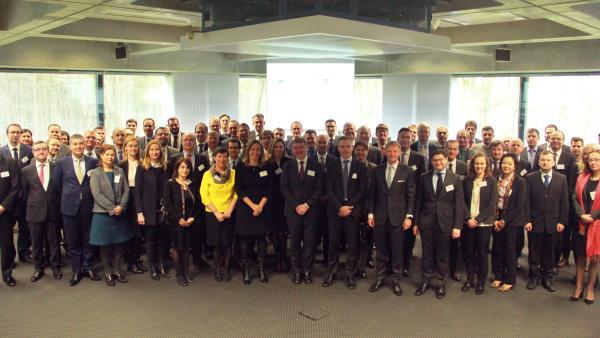
The Vienna Initiative has agreed to establish a Working Group on Capital Markets Union. This follows the European Union’s push to strengthen Capital Markets which will have a major impact on financing of investment and sustaining growth in the Central, Eastern and South-Eastern Europe region (CESEE). “Strengthening and diversifying sources of finance is crucial in the region today, as the regional catching up process advances and a new model for growth emerges”, commented Werner Hoyer, the President of the European Investment Bank (EIB), which is hosting this year’s Vienna Initiative 2 Full Forum at its headquarters in Luxembourg.
All members of the Forum expressed their strong commitment to the work of the new Working Group, which will report by the end of 2017. The working group will help to promote the diversification of investment finance in the region, mobilize the Vienna Initiative network to analyse structural obstacles and regulatory gaps impeding capital market development in the Central, Eastern and South-Eastern Europe region (CESEE) and identify solutions at the national and regional levels.
The Vienna Initiative was founded at the height of the global financial crisis of 2008/09 as a private-public sector platform to secure adequate capital and liquidity support by Western banking groups for their affiliates in CESEE. The initiative was relaunched as “Vienna 2” in January 2012 in response to renewed risks for the region from the Eurozone crisis. Its focus is now on fostering home and host authority coordination in support of stable cross-border banking.
The Vienna Initiative Forum also looked into investment dynamics, priorities and constraints in the region and discussed how new instruments provided by the international financial institutions, focusing on environment, infrastructure, innovation and SMEs can supplement existing funding models. The Vienna Initiative will study further the design of financial instruments to support investment in the CESEE region and beyond.
A further topic, which was discussed in Luxembourg, was the recent evolution of bank regulation in home countries and at the global level. The Forum discussed the issue of unintended impediments to cross-border banking due to prudential restrictions on the cross-border flow of capital and liquidity within banking groups. The commercial bank group participants also noted that the increasing number of national regulatory initiatives in some CESEE countries have had some unintended negative consequences. The Forum received an update on the Non-performing loans (NPL) Initiative work-stream of the Vienna Initiative, which reported substantial achievements in enhancing the transparency of restructuring frameworks, building capacity through coordinated technical assistance, and sharing knowledge. All of this has partly led to a recent abatement of NPLs in the region and has helped to deepen the secondary market for NPLs, with sales of NPLs reaching EUR 7.3 billion over the last eighteen months. The Forum also discussed recent NPL dynamics and regulatory moves at the European Union level.
The Forum also took note of the fact that the economies of the region all showed fairly strong growth in 2016, and that this is expected to continue in 2017. Banking developments have supported this positive outcome. Overall deleveraging by parent banks, which started more markedly in 2011, has now largely come to an end, while domestic deposits have been growing, thus ensuring banks operating in the region have sufficient funding, while becoming less dependent on parent bank funding. Boris Vujčić, Governor of the Croatian National Bank and recently appointed Chairman of the Vienna Initiative Steering Committee stressed: “The Vienna Initiative has been important in helping the countries of the regions and their banking systems to cope with the changing pressures of recent years. I am confident that the current work priorities – monitoring funding in the region, adapting to the Banking and Capital Market Unions, broadening the successful work on NPLs, and mobilizing new investment instruments – will continue to provide substantial benefits to all participants in the period ahead.”
For additional information and the latest publications visit: www.vienna-initiative.com.
Participants of the Full Forum included representatives of Albania, Austria, Bosnia and Herzegovina, Croatia, Greece, Hungary, Kosovo, FYR Macedonia, Montenegro, Poland, Serbia, Slovakia, Slovenia, and Ukraine; major bank groups operating emerging Europe: Erste, Intesa Sanpaolo, KBC, Raiffeisen, Société Genérale, and UniCredit, National Bank Greece, Eurobank; as well as the European Commission, the European Council, the EBRD, the EIB, the International Monetary Fund, and the World Bank Group. The EBA, ECB, ESM and the BIS participated as observers.


